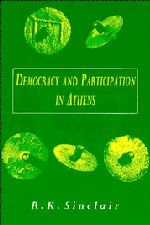Book contents
- Frontmatter
- Contents
- Preface
- Maps
- 1 The Athenian polis and the evolution of democracy
- 2 The privileges and the opportunities of the citizen
- 3 The responsibilities of the citizen
- 4 The sovereignty of the Demos, officials and the Council
- 5 Citizens and participation
- 6 The hazards of leadership
- 7 The rewards of leadership
- 8 The critics of Athenian democracy
- Appendix 1 The population of Athens
- Appendix 2 ‘Working days’
- Appendix 3 Notes on three constitutional matters
- Bibliography
- Index
Appendix 3 - Notes on three constitutional matters
Published online by Cambridge University Press: 01 June 2011
- Frontmatter
- Contents
- Preface
- Maps
- 1 The Athenian polis and the evolution of democracy
- 2 The privileges and the opportunities of the citizen
- 3 The responsibilities of the citizen
- 4 The sovereignty of the Demos, officials and the Council
- 5 Citizens and participation
- 6 The hazards of leadership
- 7 The rewards of leadership
- 8 The critics of Athenian democracy
- Appendix 1 The population of Athens
- Appendix 2 ‘Working days’
- Appendix 3 Notes on three constitutional matters
- Bibliography
- Index
Summary
(A) Variation in the recording of decrees may in part be traced to the character of the secretaryship concerned with the recording of decrees. Until 367/6 ‘the Secretary of the Boule’, who was the official directed to publish decrees, held office for one prytany. In and after 366/5 the secretary concerned (known sometimes by the same title) held office for a year (AP 54.3 and CAAP). The longer period of tenure should have led to greater efficiency and uniformity of practice (and in many respects decrees from the 350s and later display less variation in formulation, though other factors as well as the secretariat were working in this direction).
It would seem probable, however, that it was at the same time in the 360s that the method of selecting the secretary was changed from voting to sortition, and it is likely that he was no longer selected from among the bouleutai (Rhodes 135 n. 11; cf. de Laix 77). The uncertainty of these two aspects makes hazardous the deduction of reasons for the change to an annual secretary. On the basis of the observation of AP 54.3 that previously the most distinguished and trust worthy men were selected, it has been argued that the change was designed to downgrade the importance of the secretary by the introduction of sortition with its egalitarian assumptions. It should, however, be noted that the author of AP, if (as is likely) he is not Aristotle himself, shares with Aristotle a disposition to explanation in terms of anti-aristocratic attitudes in democracies.
- Type
- Chapter
- Information
- Democracy and Participation in Athens , pp. 228 - 229Publisher: Cambridge University PressPrint publication year: 1988

